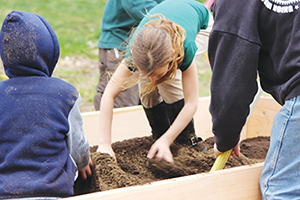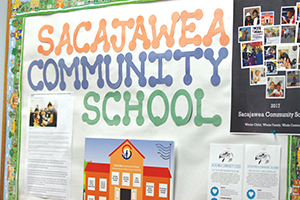By BETSY TAYLOR
Trinity Health began its Transforming Communities Initiative in 2016 to combat tobacco use and curb obesity — leading drivers of preventable chronic disease and high health care costs in the United States.
Recognizing that healthy and un-healthy habits can take root very early, Promise Partnerships, one of the initiatives that Trinity Health is funding with multiple-year Transforming Communities grants, is aimed at improving the health and well-being of infants and schoolchildren.

Lemmons
Trinity Health's Saint Alphonsus Regional Medical Center and the United Way of Treasure Valley lead the Boise, Idaho-based collaboration. Trinity Health has awarded $2.25 million over five years beginning in 2016 to advance the Promise Partnerships' goals, said Rebecca Lemmons, Saint Alphonsus Health System grant development specialist.
The money supports community and school-based efforts to promote health and well-being of children and families and state-level advocacy for programs known to contribute to health — things like raising the sale age for tobacco purchases. It pays for consultants and program staff who take the Promise Partnerships' strategy into the greater community where it can make a difference in quality of life and improve access to resources, particularly for low-income families.
Idaho is one of the fastest growing states in the nation, and the Treasure Valley in the southwest part of the state — made up of Ada, Canyon and Gem counties — is home to about 40 percent of Idaho's population. The United Way of Treasure Valley says 32 percent of Treasure Valley residents have "limited income/poverty" status. Data from the Centers for Disease Control and Prevention show that more than half of Treasure Valley residents are overweight.
Building a healthy culture
The work in Idaho has included promoting breast-feeding; advocating for policies to make 21 the minimum age to buy tobacco; improving health resources and health education in schools; and developing and implementing "complete street" plans to improve transportation and street networks for drivers, pedestrians, transit users and bicyclists.
Promise Partnerships is focused on "sustainable change through policy, systems and environment," said Lindsey Turner, a research professor with Boise State University College of Education. She is leading the evaluation of the overall initiative.

Havlicak
Ashley Havlicak, the United Way of Treasure Valley's program director for Promise Partnerships, said the program has increased the conversation around "social determinants of health and how we can address those for our communities." (Havlicak has since moved on to a new position.)
Advocating for reforms
Promise Partner-ships worked to pass a law prohibiting authorities from charging women breast-feeding in public with indecent exposure. Idaho was the last state in the nation to provide women with this legal protection, said Lemmons. While the coalition partners had not heard of any women being legally cited for breast-feeding in public, they were aware of instances where women were asked to discontinue a feeding and leave a location, and the activism and publicity surrounding the legislation raised public awareness that breast-feeding is as natural as it is good for mothers and babies.

Volunteers plant a vegetable garden in the Canyon Hill neighborhood of Caldwell, Idaho. It is primarily funded through Trinity Health's Transforming Communities Initiative in conjunction with Promise Partnerships. Most of the harvest goes to Sacajawea Elementary School and other community schools.
Promise Partnerships continues to advocate for legislation to raise the legal age to buy tobacco to 21. The Tobacco 21 measure has twice failed, and the coalition is rethinking its strategy. It may shift its public education campaign to emphasize the dangers of using electronic cigarettes, also known as "vaping" or "Juuling" after the popular brand of e-cigarette devices.
Flavor pods or cartridges used with vaping devices contain nicotine, which is addictive. According to the Centers for Disease Control and Prevention, "preventing tobacco use among youth is critical to ending the tobacco epidemic in the United States." Flavorings in tobacco products can make them more appealing to youth. The CDC said that, nationwide, nearly five of every 100 middle schoolers and nearly 21 of every 100 high school students reported using e-cigarettes last year.
Community schools
In the Boise and the Caldwell school districts, partnership representatives have met with school administrators, teachers and staff to devise ways to improve nutrition and physical activity.
Beyond that, the partnership has supported the creation of community schools in the region. Such schools work to build relationships with families, neighborhoods and community organizations invested in the well-being of children.
Sacajawea Elementary School in the Caldwell School District, located about 28 miles west of Boise, is among the schools to adopt the community school model. The school of about 500 pre-kindergarten to fifth grade students has many children from low-income families.
Principal Paul Webster said to get a better handle on the unmet needs of its families, the school and community partners surveyed parents and staff and analyzed community health data. They identified five main areas of concern: overall health status; academics and learning; insecurity around necessities like food, clothing and housing; and a lack of dependable, affordable transportation and childcare.
Sacajawea Elementary School has made addressing those concerns a priority. Webster said, "That has been a godsend, honestly, to say these are the things we're going to work on." Webster said part of the community school model is about learning what resources already exist in an area and helping people access them.

A bulletin board at Sacajawea Elementary School allows parents, teachers and visitors to learn more about community school resources and areas of focus.
A Delta Dental mobile dental clinic has provided checkups, cleanings and fluoride treatments on school grounds. Clinicians from Saint Alphonsus have conducted health screenings, like blood glucose testing, and some care, like ear cleanings.
The dental or medical checks usually are offered when a lot of families will be on site, such as during parent-teacher conferences or a Trunk or Treat gathering.
The school converted a maintenance closet into a counseling room where the behavioral health clinicians now provide individual therapy for select students. The partnership's work led to having licensed clinical counselors on-site, provided through an outside agency. The counseling is not funded by grants, but billed to insurance or Medicaid.
Webster said often a family recognizes it needs help, but doesn't know where to start. For instance, accessing health care can be a challenge for a family without health insurance. Using grant funds, the school contracts with United Way, which posts a community school coordinator on campus to link families to the right resources.
The community schools approach has gained traction in the Treasure Valley, with more than 20 schools beginning the approach in the 2018-19 school year across the region.
Concrete results
Turner, the researcher leading the evaluation of Promise Partnerships programs, said school staff tell her they see benefits for children and families from the Promise Partnerships work and that the progress is gratifying. "If families are not having support for their basic needs, it's really hard for them to live a healthy life," she said.
The Transforming Communities Initiative also has laid the groundwork for changes to the built environment in Caldwell.
Part of the funding from Trinity Health paid for a consultant to assess and make recommendations related to improving streetscapes — looking at walkability and bikeability, and making suggestions like where to improve crosswalks or install traffic lights.
From there, the city of Caldwell — a community of about 50,000 where about 20 percent of residents live in poverty — won a $250,000 Safe Routes to School grant from the Idaho Transportation Department. It will allow for improvements, including some new sidewalks and biking lanes. Bicycle racks at parks will encourage exercise as will shaded areas in playgrounds, so kids will want to play outside even in the heat.
The partnership facilitates greater collaboration in Treasure Valley-area communities. Lemmons said, "It has allowed us to align to bigger goals."